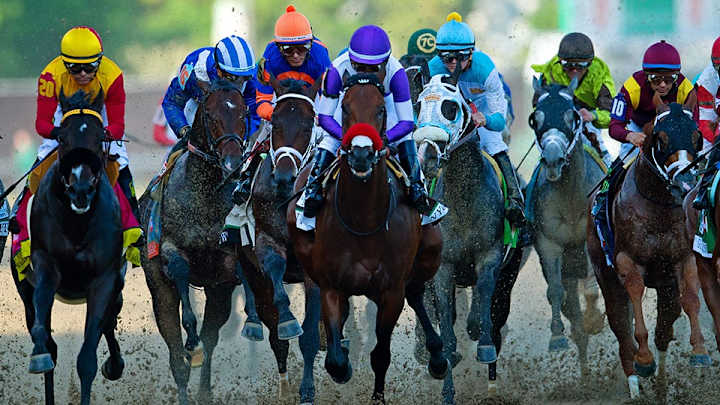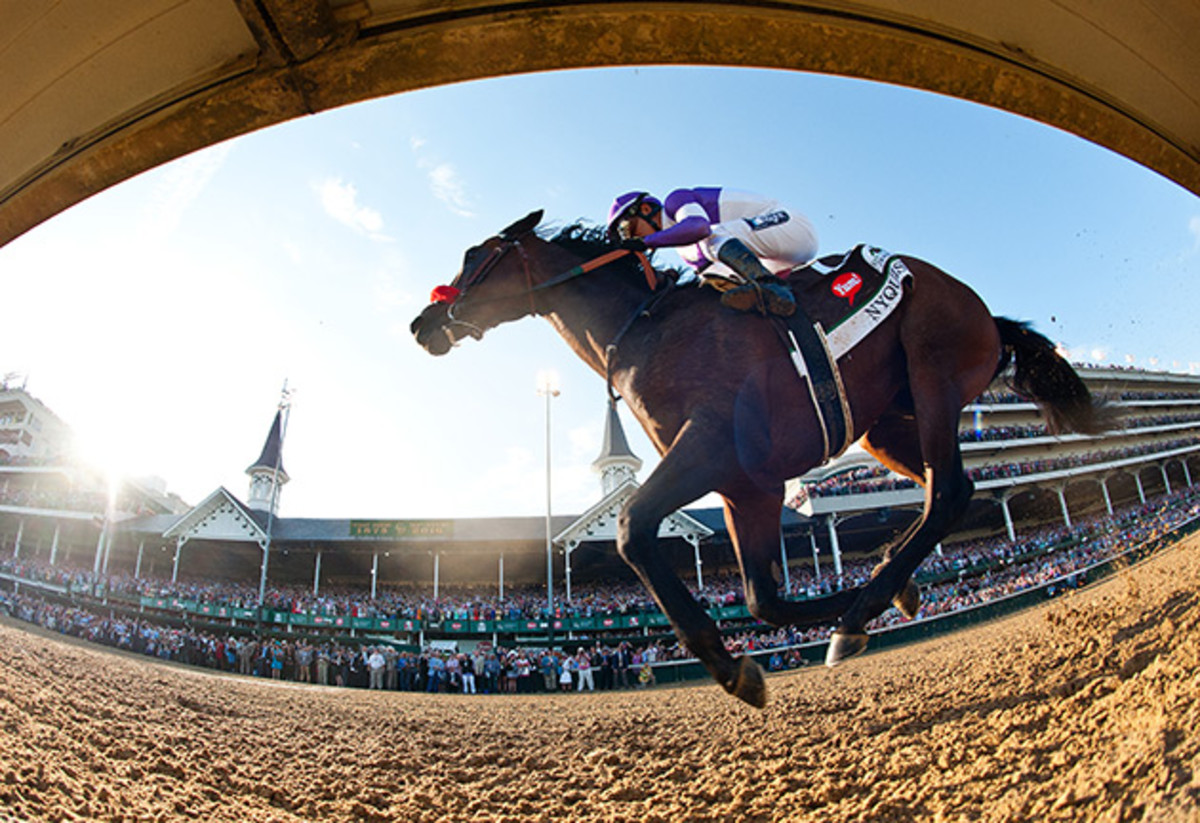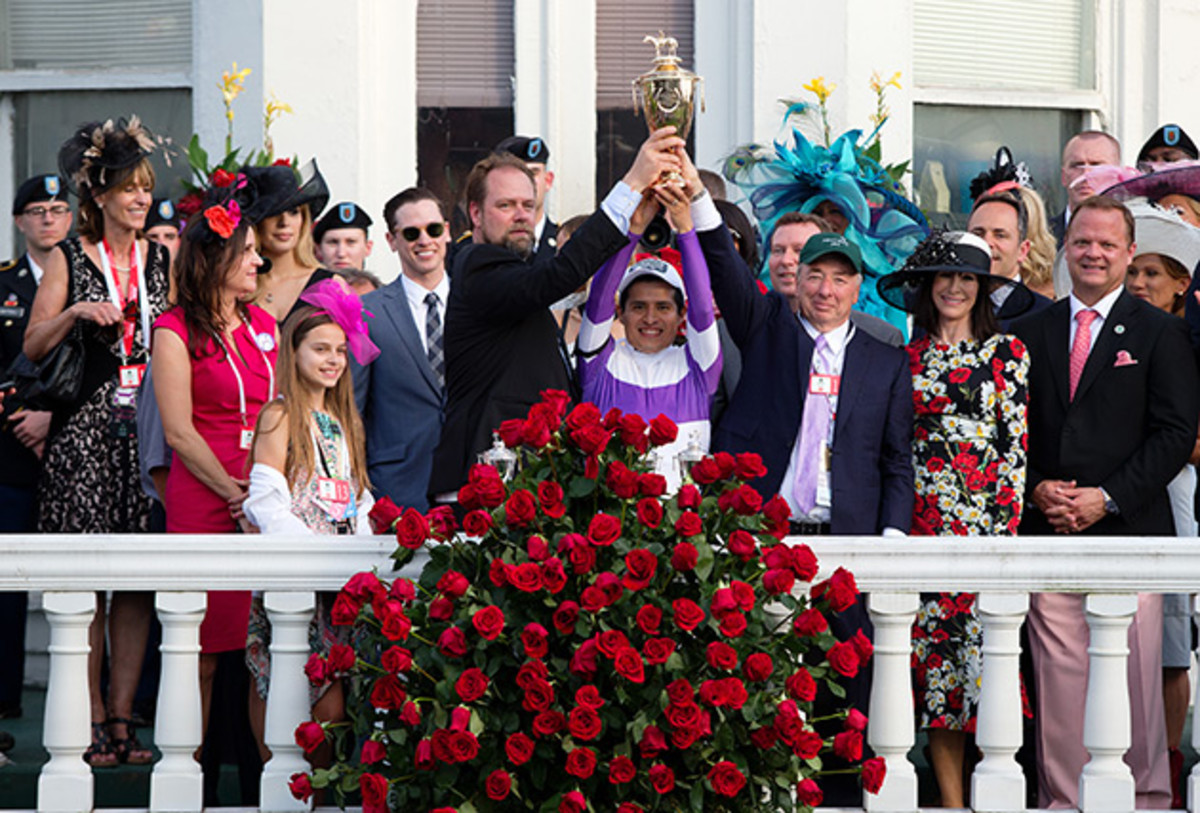Nyquist answers call, reignites Triple Crown chase with Derby win

Get all of Tim Layden’s columns as soon as they’re published. Download the new Sports Illustrated app (iOS or Android) and personalize your experience by following your favorite teams and SI writers.
LOUISVILLE — Always and forever, the Kentucky Derby asks a question and over the duration of 1 1/4 miles and two minutes of time, answers it. Late Saturday afternoon at Churchill Downs, it asked a bay three-year-old colt named Nyquist to prove himself. It asked him to show that seven straight victories in an unbeaten career, that a championship last year as a racing rookie, that dominant performances in two prep races this spring were all truthful harbingers of something more transcendent. It asked him to step onto a stage unlike any other in racing and own it. To play a worthy encore to last year’s historic Triple Crown by American Pharoah. It asked him to be great.
The answer came resoundingly. Late on a spring day where black clouds and windswept rain gave way to sunshine at post time, Nyquist ran almost dangerously fast for the first half of the race and then with indomitable courage for the second half, flashing beneath the twin spires of Churchill Downs 1 1/4 lengths in front of the fast-closing Exaggerator. He became the first unbeaten winner of the Derby since Big Brown in 2008 and the first unbeaten, two-year-old champion to win since Triple Crown winner Seattle Slew in 1977, joining very fast company and giving the racing community reason to cautiously consider the delicious—though still distant—possibility that another Triple Crown is possible.
Behind Kentucky Derby favorite Nyquist, a familiar team
Nyquist brought familiar faces to the winner’s circle. Owner Paul Reddam (a Canadian native and lifelong hockey fan who named Nyquist for right wing sniper Gustav Nyquist of the Detroit Red Wings), trainer Doug O’Neill and jockey Mario Gutierrez were also together with 2012 Derby (and Preakness) winner I’ll Have Another. Back then, their ride was partly shadowed by concerns over O’Neill’s recent rules violations; this time there is only euphoria and the embrace of a very talented racehorse. “He’s a special, special horse,” said O’Neill after the Derby. “We’re so fortunate to have him.”
In a year when many of the horses in the Derby seemed flawed in some significant way, Nyquist was nearly without warts. He won all five of his races as a two-year-old, including the Breeders Cup Juvenile 75 miles down the road at Keeneland Race Track in Lexington last Halloween afternoon. He won both his 2016 prep races, including a trouncing of the previously unbeaten Mohaymen in the April 2 Florida Derby. A typically massive and rowdy Derby crowd of 167,227, second largest in history, made Nyquist a 2–1 favorite—2.30 to be exact, which made him the shortest-priced favorite since Point Given (who was beaten) in 2001. Yet the racing establishment and media had been slow to validate Nyquist, perhaps still hung over from Pharoah’s remarkable run a year ago. They wondered if his spotty pedigree would allow him to make the distance of the Derby and if his light schedule had readied him for the grueling Derby.
In the race, as expected, speedy Danzing Candy and jockey Mike Smith raced to the lead from the outside, No. 20 post position. Gutierrez put Nyquist, from the No. 13 spot, right behind him. Danzing Candy sizzled through the first quarter mile in 22.58 seconds and half-mile in 45.72, potentially suicidal fractions. Gutierrez sat. “I saw that Mike Smith really wanted the lead,” said Gutierrez. “I wasn’t going to battle him. I know Nyquist so well. And it’s my job to know the pace.”

Watching from a track-level box in the homestretch, O’Neill was briefly worried. “I saw 45 and change and that was fast,” said O’Neill. “But then I saw Mario lay back a little bit and that was such a smart move.”
With three-eighths of a mile to run, entering the final turn, Louisiana Derby winner winner Gun Runner, the 10–1 third betting choice, moved to Nyquist’s throat under jockey FlorentGeroux. At the same time, Danzing Candy dropped back abruptly, finished. Gutierrez allowed Gun Runner to put a nose briefly in front of Nyquist, but then moved his hands and took the lead back. Leaving the quarter pole, Nyquist exploded and opened up a massive five-length lead. Handicappers analyzing this Derby had noted that half a dozen horses possessed strong closing speed. It became a matter of whether any of them could run down Nyquist, and whether Nyquist would tire.
Nyquist wins 2016 Kentucky Derby
Only Exaggerator, winner of the Santa Anita Derby in April, came close, but he settled for second. Jockey Kent Desormeaux said, “I was sitting on a monster today, but I was involved in an altercation [on the turn] and had to duck in and then back out. I believe I was the best horse today.” Replays did not show any significant interruption in Exaggerator’s run, and Keith Desormeaux, Exaggerator’s trainer (and Kent’s brother), said, “I don’t think Exaggerator hit the brakes as much as Kent alluded to. He had clear running room the entire quarter-mile home stretch.”
Gun Runner held on for a game third-place finish over Mohaymen. Next to the scale where jockeys are weighed after riding, a conversation between Gun Runner’s trainer, Steve Asmussen, and jockey Geroux spoke volumes about Nyquist.
Geroux: “I was sitting chilly, chilly, chilly for a long time and then I got head-to-head with Nyquist. At the top of the stretch, that horse was just faster than mine.”
Asmussen: “It’s okay. We ran good. Nyquist is a great horse, He’s won five Grade One races.”
Geroux: “I’m sorry, boss. We were head-and-head. I tried.”
Asmussen: “Stop it. Nyquist got us. That’s all. He’s good. Stop it.”
Nyquist did slow down: His fourth quarter-mile, on the turn, was run in 25.21 seconds, and the final quarter, down the homestretch to the wire, was 25.70, both products of the brutally fast first half-mile. But the final winning time of 2:01.31 was the fastest Derby since Funny Cide went 2:01.19 in 2003. Faster than American Pharoah (2:03.02), faster than California Chrome (2:03.66), faster than Big Brown (2:01.82). Final times are wildly subject to pace and track conditions, but Nyquist ran manifestly fast and held up to the fast start better than any other horse that near the front early.
The SI Extra Newsletter Get the best of Sports Illustrated delivered right to your inbox
Subscribe
Nyquist’s journey to the winner’s circle took numerous stops. Born on March 10, 2013 from the first crop of Uncle Mo, the talented colt who would have been the favorite in the 2011 Derby had he not become sick, Nyquist was sold three times. He was sold first for $180,000 as an eight-month-old weanling and then 11 months later in September of 2014 for $230,000. The buyer was Irishman Niall Brennan, a longtime and respected Florida pinhooker (slang for a person who buys horses, teaches them to run, and then sells them for a profit).
Brennan worked the unnamed Nyquist on his farm for six months. “He was outstanding,” says Brennan. “A perfectly behaved colt, did everything right. He’s an exceptional athlete, like Kobe Bryant or a Jerry Rice.” Brennan entered him in a sale of two-year-old horses at Gulfstream Park in March of 2015. He expected the handsome colt to sell for something close to a million dollars. Meanwhile, Dennis O’Neill, Doug’s brother and the sales savant who selects many of the horses for Reddam to buy and Doug to train, examined and loved the colt and told Reddam to expect nearly a million.
Instead, the colt sold for $400,000. Dennis O’Neill was shocked. Brennan was disappointed. Apparently at least one veterinarian had detected some degree of unsoundness in Nyquist’s limbs. “That’s all baloney,” says Brennan, and Nyquist’s performances have endorsed that.
What did American Pharoah’s Triple Crown mean for racing?
O’Neill and Reddam ran Nyquist five times as a two-year-old at three different racetracks. He made his 2016 debut in a seven-furlong race at Santa Anita Park in California and defeated Exaggerator by 1 1/2 lengths. What made that performance significant was that O’Neill was just trying to get Nyquist warmed up for the season and Exaggerator was trying to win. “That was the race that told me how great Nyquist really is,” said Keith Desormeaux during Derby week. “For that seven-furlong race, I had Exaggerator cranked up and ready to go and we could not get past Nyquist.” A year ago, racing aficionados raved about American Pharoah’s beautiful running action, efficient and powerful at the same time. Desormeaux said Nyquist is similarly efficient, “but he’s not as big and powerful as American Pharoah.”
For the O’Neills, Reddam and Gutierrez, a second victory in the Derby, and now a second try at the Preakness and potentially the Triple Crown, is both different and familiar. It is different because I’ll Have Another was a hard-working grinder who surprised the racing game with his Derby and Preakness wins. He did not seem exceptional. Nyquist is potentially exceptional. “From the first day I had this horse,” said O’Neill in an interview at Keeneland before the Derby, “he just refused to take a step backward. He’s always been mature, mentally and physically. He’s smart and he’s tough and resilient.”
The toughness is evident. Dennis O’Neill sat next to his brother and watched Exaggerator closing the stretch of the Derby, without a worry. “That horse was never getting past him,” said O’Neill, “no matter how long they kept running.”

And the return of Team O’Neill is familiar for the rollicking joy that it brings to a racetrack. Some of that was lost in 2012 because of dueling narratives. Not this time. Several days during Derby week, the O’Neill brothers and some of their friends went to the home of University of Louisville basketball equipment manager Vinny Tatum, with whom they have become friendly. (Tatum is also close friends with coach Rick Pitino, who is also friendly with the O’Neills through previous shared interests in horses.) At Tatum’s home, they would drink tall shots of tequila, in the morning.
They repeated this routine on the morning of the Derby, the group going through three bottles of tequila at 9 a.m. “It was our superstition,” says O’Neill. It was an early celebration of the victory that lay ahead. In the wild aftermath of the Derby win, O’Neill walked up the tunnel that leads from the racetrack to the paddock. A friend shouted to him and O’Neill shouted back the name of a local bar. It was as if he was inviting an entire sport to join his party. In truth, the next real stop is Baltimore, for another race, another question, and perhaps, another encore.
